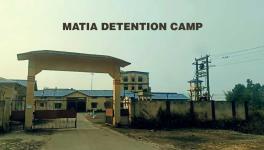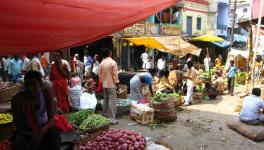Rohingya Refugees Await Resolution or Return
More than a million refugees currently reside in the camps in Bangladesh, but few feel at home
Five years after the latest and biggest mass exodus of Rohingya to Bangladesh, people in the camps say that the limbo they are living in is never ending. They don't see much hope to get their normal lives back.
More than 1 million Rohingya currently reside in Bangladesh, but few people would call it home.
On a recent day, Hasina Begum asked her father to bring water from the community well because her husband was currently away from the refugee camp. This 23-year-old woman can't do it herself because of her physical inability, that she is trying to conceal with her yellow dupatta — a shawl traditionally worn by women to cover the head and shoulders.
When asked the reason for her disability, Begum told DW with tears the story of a day five years back.
"They (Myanmar military) hit me with a rod,"Begum said. I was drenched with blood, and they thought I was dead. So they left me there."
Five years later, she still has pain in her head and feet.
Begum was a victim of a brutal clampdown by Myanmar's military in 2017. The Myanmar military began a sweeping campaign of massacres, rape, and arson in northern Rakhine State on August 25, 2017, following attacks on the border posts by some Rohingya militants.
The campaign killed thousands of Rohingya, according to many international organizations, including Doctors Without Borders. At the time of the exodus, the United Nations say more than 745,000 people fled to neighboring Bangladesh. That figure now stands at over a million. Begum and her family now live in a refugee camp.
Life in the Bangladeshi camps
Begum lives with her husband and child in a tiny two-room house in the Balukhali camp in Cox's Bazar, the largest refugee camp in the world, hosting about 600,000 refugees, according to figures from a number of human rights bodies, such as the Refugee Council USA.
"My husband has no work," Begum said. He goes to Tabligh (a religious group)" for food and other aid.
Most of the people are unemployed, including Begum's 44-year-old father, Enayetullah. He returns with a pot of water.
"We had huge farmlands," Enayetullah said. I used to cultivate them. We had cattle, a house and a lot of possessions. We left them all behind."
Enayetullah said he did not think of his possessions when he fled Myanmar. But now after five years, he misses his home, and his lands.
Seeking work, without prospects
Many people in the camps want to work and rebuild their lives.
"We can't go out of the camps. Sometimes we get a call to work. But that is rare," says 33-year-old Mohammad Shafi.
The Rohingya are also struggling with limited education opportunities.
Mohammad Riaz is a 10th-grade student. This will be his last year of education inside the camps.
"After this year I will have no opportunity to study further, but I want higher education," Riaz told DW.
Searching for more opportunities, many Rohingya try to flee the camps to and leave Bangladesh.
Elaine Pearson, the acting Asia director at Human Rights Watch, released a statement on the eve of the anniversary of the 2017 exodus, saying: "Donors should support Rohingya refugees to study and work freely and safely so they can build independent and self-reliant futures."
UN's Bachelet visits Bangladesh
UN Human Rights Commissioner Michelle Bachelet recently visited the Rohingya refugees in Bangladesh, with community representatives telling her that they want to build a better life.
"One day I want to go home, but I don't know when I can," Enayetullah said.
The life of the Rohingya remains in limbo within the camps, with no end in sight to their current plight.
"When I remember my homeland, my heart burns. I want to go back," Tasmida Begum told DW. "But only if they give us peace — and give our possessions back."
Tasmida Begum is afraid that the military might attack again if she goes back. She lost a brother and a brother-in-law in 2017.
Aung Kyaw Moe, an adviser to the National Unity Government of Myanmar, run by the Suu Kyi led NLD party, told DW that repatriation has not been possible because of a lack of interest from Myanmar's government.
"It is not happening because of the lack of political will from the Myanmar side," Moe said. He is the first Rohingya to hold a position in Myanmar's government. "They don't want them to go back."
Repatriation talks are underway among Myanmar, Bangladesh and different UN bodies. A joint task force is in place to finalize the list of Rohingya people to be repatriated.
"We have already given them a list of 830,000 Rohingya. They have accepted that," Shamsud Douza, an additional commissioner at the Refugee Relief and Repatriation Commissioner's Office, told DW. "We are providing them with humanitarian aid, but at some point they have to leave."
Bangladesh anticipates sending the Rohingya people back to Myanmar. On Sunday, Foreign Minister Masud Bin Momen told the press that repatriations could begin by the end of 2022.
"We are hopeful we can start the repatriation by the end of the year. We are trying to do it for our own interest because they are becoming a burden for us," he said.
After two prior repatriation attempts failed, Moe said the list might just be a method of delaying the process. "Myanmar has the list. They know very well who have fled," he told DW. "If they really want to initiate the repatriation process they would have given a list to Bangladesh, find them and send them back."
Will there be justice?
Five years on, nobody has been held accountable for the brutality that happened in Myanmar. Gambia has launched a genocide case about the issue before the International Court of Justice (ICJ). The case is being heard. The Myanmar government had filed an appeal, but this has since been rejected.
Rights organizations demand that the UN Security Council end its current inaction and urgently negotiate a resolution to institute a global arms embargo on Myanmar. Human Rights Watch said the Security Council should refer the situation to the International Criminal Court and impose targeted sanctions on the junta and military-owned conglomerates.
But a UN action on this scale might be vetoed by China and Russia.
"China has always been a problem for the Rohingya,"Moe said. We have to find an innovative way to deal with the blockages created by China and Russia particularly in the Security Council and other UN bodies."
Hasina Begum said she had no idea what justice would look like. To her, getting back to a normal life is a long way off, with the mental and physical wounds leaving more than just the visible scars on her body.
"I don't know what will happen next,"she said. I don't see a future here or anywhere."
Edited by: John Silk
Get the latest reports & analysis with people's perspective on Protests, movements & deep analytical videos, discussions of the current affairs in your Telegram app. Subscribe to NewsClick's Telegram channel & get Real-Time updates on stories, as they get published on our website.
























